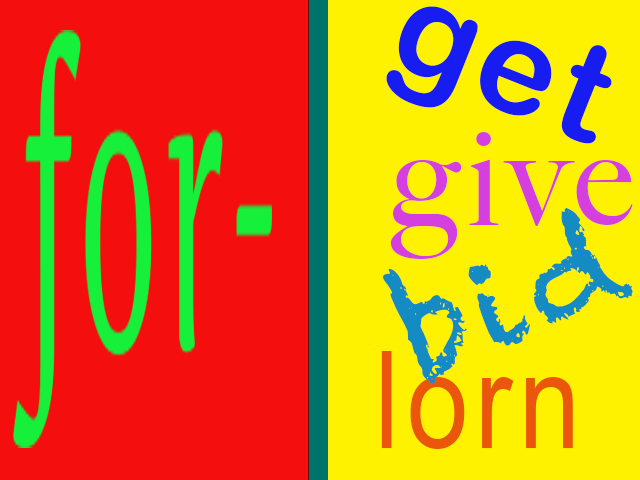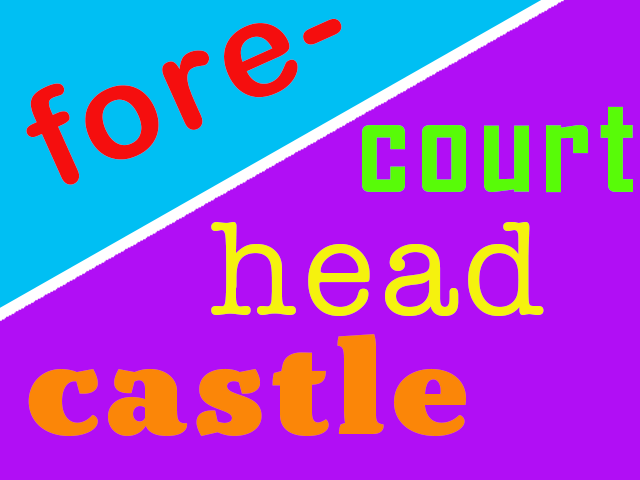Revised as of
19 Nov 2022
People tend to confuse this pair of heterographs (a subset of homophone) for- and fore-. And why not? They sound the same . . .
Ahh, but then we remember this is English with all its confusions.
For- is a prefix that is combined to indicate rejection or prohibition, to note falsity or wrongness, or used to give intensive force.
The blog over at the Oxford Dictionaries provides this tip on fore-. It comes from before and “is added to words to form words (combined forms) which have a group of meanings related to these main ideas:
- Before or in advance of someone or something in time
- So today’s weather forecast tells you what the future weather is likely to be.
- If you are foresighted, you’re able to think and plan ahead.
- In front or at the front of someone or something in terms of position
- A forecourt is an area in front of a building.
- Your forehead is at the front of your head.
- In front of someone or something in rank or order
- A foreman was originally a person who literally led others from the front, developing into the later meaning of a leader or supervisor of people.
Combined Form or Prefix?
A number of dictionaries state that fore- is a combining form while a few others claim it’s a prefix. In looking at the definitions for both grammar types, a prefix is only part of a larger word while a combined form creates a new word with its own meaning. Yet in applying either definition to for-, it is also a combining form as well as a prefix, just as fore- is both as well.
NOTE: Per Kastovsky, there is a lack of clear distinction between combined forms and affixes (prefixes, infixes, and suffixes).
You may also want to explore “For vs Fore vs Four” and “Foreword versus Forward“.
Word Confusions . . .
. . . started as my way of dealing with a professional frustration with properly spelled words that were out of context in manuscripts I was editing as well as books I was reviewing. It evolved into a sharing of information with y’all. I’m hoping you’ll share with us words that have been a bête noire for you from either end.
If you found this post on “For- versus Fore-” interesting, consider tweeting it to your friends. Subscribe to KD Did It, if you’d like to track this post for future updates.
| For- | Fore- |
|---|---|

|

|
| Part of Grammar: | |
| Combined Form and/or Prefix | Combined Form and/or Prefix, take your pick . . . |
| Indicating rejection, prohibition, exclusion, omission, failure, neglect, or refusal
Indicating falsity or wrongness Used as an intensifier
Away Opposite Completely
Destructively or detrimentally |
Noun: Situated in front of The front part of Of or near the bow of a ship Preceding
Verb: Beforehand
|
| Examples: | |
| Preposition: I stood forment a roaring fire. Verb: I will forbear to discipline you this time. You dare to forswear your word! She is forlorn at the thought of losing Jonathan. Rebecca could not forbear a smile. I forbid you to go out with that boy! I swore that I would lead us safely home, and I do not mean to be forsworn. Paul didn’t know if he could ever forgive Annette. It was a forlorn attempt to escape. She wanted to forgo the tea and leave while they could. God forfend that we should allow the media to tell us how to run our business. It was a horrible incident she couldn’t forget. |
Noun: At the front, a cobblelock forecourt allows for parking for three cars. Over time the neural tube expands at one end to form an embryonic brain with constrictions marking the forebrain, midbrain, and hindbrain. Heads was the name given to that part of sailing ships forward of the forecastle and around the beak which was used by the crew as their lavatory. For many generations, my forefathers have been lumbermen, loggers, and mill workers. Verb: It forebodes a deeper commitment than we have seen evidence of in just the 10 episodes. Nationally, this foreshadows economic disaster unless we can pull off a political and cultural about-face regarding education. |
| History of the Word: | |
| Old English for- meaning loss, destruction, or completion, can also used as an intensive or pejorative element, which is related to the Old Norse for-, the Dutch ver-, the Old High German fir-, and the German ver- and is related to the Latin per- and the Greek peri-. | The adverb fore was used as a prefix in Old English and other Germanic languages with a sense of before in time, rank, position, etc., or designating the front part or earliest time. |
C’mon, get it out of your system, bitch, whine, moan . . . which words are your pet peeves? Also, please note that I try to be as accurate as I can, but mistakes happen or I miss something. Email me if you find errors, so I can fix them . . . and we’ll all benefit!
Satisfy your curiosity about other Word Confusions on its homepage or more generally explore the index of self-editing posts. You may also want to explore Book Layout & Formatting Ideas, Formatting Tips, Grammar Explanations, Linguistics, Publishing Tips, the Properly Punctuated, Writing Ideas and Resources, and Working Your Website.
Resources for For- versus Fore-
Apple Dictionary.com
Dictionary.com: for- and fore-
The Free Dictionary: for-
Kastovsky, Dieter. “Astronaut, Astrology, Astrophysics: About Combining Forms, Classical Compounds and Affixoids.” Selected Proceedings of the 2008 Symposium on New Approaches in English Historical Lexis (HEL-LEX 2). Vienna University. Online PDF. 2009. http://www.lingref.com/cpp/hel-lex/2008/paper2161.pdf.
Maddox, Maeve. “Words Beginning With For- and Fore-.” Daily Writing Tips. n.d. Web. n.d. <https://www.dailywritingtips.com/words-beginning-with-for-and-fore/>. This article explores the topic in a different way.
Oxford Living Dictionaries: for- and fore-
Pinterest Photo Credits:
Sailors Clear the Ship’s Forecastle of Snow and Ice is from an official US Navy page from United States of America and is in the public domain, via Wikimedia Commons.


